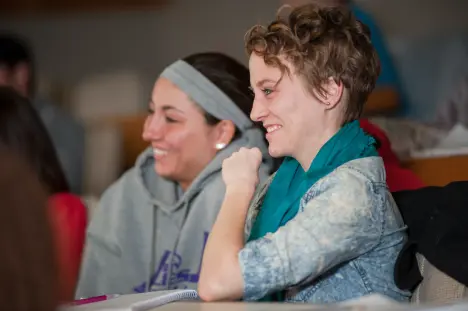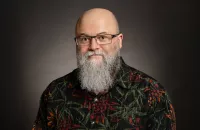Cultivating a Love of Wisdom
It’s one thing to make a living, and another thing to learn how to live well. Studying Philosophy at Ashland University can help you do both.
The Philosophy Department aims to cultivate a love of wisdom in students. We provide students with the tools to be educated and productive members of the world, regardless of their profession or vocation. We teach students to seek purpose in their lives and to make informed, objective and consistent judgments.
Philosophy is the original discipline that teaches you how to think, not what to think! It will help you develop the intellectual tools necessary to expand your understanding of both the ordinary and profound questions of life. You will gain communication, analytical, and problem-solving skills that will help you succeed in a wide range of occupations or in graduate school.
Ashland University’s Philosophy Department is one of the few of its size to offer comprehensive study both in analytical philosophy—with an emphasis on logic, reasoning, and analysis—and continental philosophy—with its emphasis on aesthetics and literary approaches to thought.
With a 24-credit-hour major and a 15-credit-hour minor, Philosophy at AU complements most academic profiles. Many students easily add it as a second major or a minor. The study of Philosophy is integrated into a variety of other disciplines on campus, such as Art, Nursing, Religion, the Ashbrook Scholars program, Interdisciplinary Studies, Education, Environmental Science and even Criminal Justice.

Programs
Phi Sigma Tau
Phi Sigma Tau is the international honor society in philosophy, with a network of more than 200 chapters throughout the United States and Canada. Phi Sigma Tau encourages interest and activity among students and promotes ties between philosophy departments in accredited institutions.
Ashland University's PHI SIGMA TAU, Ohio Mu Chapter honors students who have demonstrated academic excellence in philosophy. Membership is by invitation, selected from students who have completed nine semester hours of philosophy with a GPA of at least 3.5 in two of those classes, and a cumulative GPA of 3.2 or higher.

AU Philosophy Club
Members of the Ashland Philosophy Club are interested in philosophy, getting together, eating pizza, watching the occasional movie and getting into existential trouble.
Meetings are commonly held twice a month during the semester. We also conduct our traditional Socrates Café discussions, host movie nights and participate in the occasional Phil Core Brannigan.
Watch for fliers on campus, visit our Facebook page or email one of the officers to get on the email list.
Everyone and anyone is welcome, no philosophy background necessary.

Contact Information

Associate Professor of Philosophy
